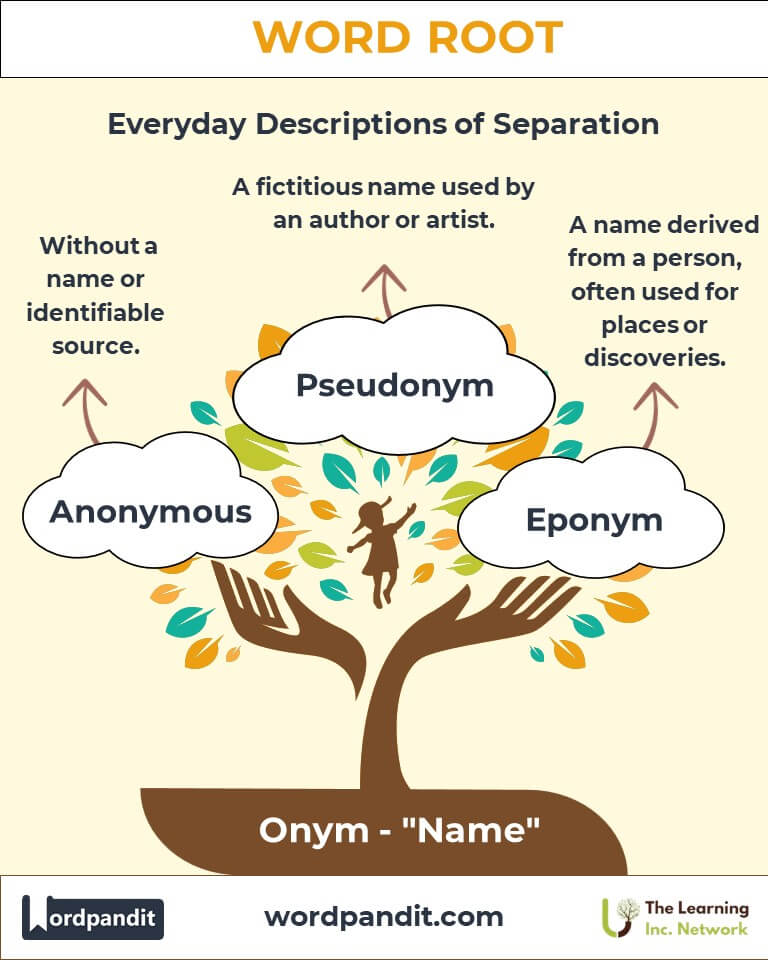Onym: The Root of Names in Language and Identity
Byline:
Discover the fascinating world of the root "onym," meaning "name." From terms like "synonym" to "anonymous," explore how this root has shaped the ways we communicate and understand identity across various fields.

Table of Contents
- Introduction: The Power of Names
- Etymology and Historical Journey
- Mnemonic: Unlocking the Power of Onym
- Common Onym-Related Terms
- Onym Through Time
- Onym in Specialized Fields
- Illustrative Story: Onym in Action
- Cultural Significance of Onym
- The Onym Family Tree
- FAQs about the Onym Root
- Test Your Knowledge: Onym Mastery Quiz
- Conclusion: The Living Legacy of Onym
Introduction: The Power of Names
What’s in a name? From establishing identity to connecting meaning, names are the cornerstone of communication. The root "onym," derived from the Greek "onyma" or "onoma," meaning "name," is embedded in many familiar and specialized words. Pronounced "OH-nim," this root serves as a linguistic foundation for exploring ideas of naming, identity, and classification in language, literature, and beyond.

Etymology and Historical Journey
The word root "onym" traces back to ancient Greek civilization, where "onoma" (name) played a crucial role in organizing thought and categorizing the world. Greek philosophers like Aristotle used terms derived from this root to discuss logic, linguistics, and identity. The root traveled through Latin into modern English, shaping our vocabulary to this day.
Mnemonic: Unlocking the Power of Onym
To remember "onym," picture a name tag that says, “Hello, my name is Onym!” This simple association emphasizes its connection to naming and identity.
Mnemonic Device:
"Onym names it all—synonyms, antonyms, and anonymous calls!"
Common Onym-Related Terms
- Synonym
Pronunciation: SIN-uh-nim
Definition: A word having the same or nearly the same meaning as another.
Example: "Happy" and "joyful" are synonyms. - Antonym
Pronunciation: AN-tuh-nim
Definition: A word opposite in meaning to another.
Example: "Hot" and "cold" are antonyms. - Anonymous
Pronunciation: uh-NAH-nuh-muhs
Definition: Without a name or identity.
Example: "The donation was made by an anonymous benefactor." - Homonym
Pronunciation: HAW-muh-nim
Definition: A word that sounds like another but has a different meaning.
Example: "Lead" (to guide) and "lead" (a metal) are homonyms. - Pseudonym
Pronunciation: SOO-duh-nim
Definition: A fictitious name used by an author or artist.
Example: "Mark Twain" was the pseudonym of Samuel Clemens.
Onym Through Time
- Acronym:
- Origin: Introduced in the 20th century for abbreviations formed by initials (e.g., NASA).
- Evolution: Now a common tool for simplifying complex phrases.
- Eponym:
- Historical Use: Initially referred to people whose names were given to places or discoveries (e.g., "Sandwich" from the Earl of Sandwich).
- Modern Significance: Reflects the enduring impact of naming on culture and innovation.
Onym in Specialized Fields
- Literature: Pseudonyms allow authors to create alternate identities and explore new genres.
- Technology: Usernames derive from the concept of "name," emphasizing identity in online interactions.
- Medicine: Eponyms name diseases or procedures after their discoverers (e.g., Parkinson’s disease).
- Branding: Trademarks use unique names to establish brand identity and trust.
Illustrative Story: Onym in Action
In a bustling city, a young writer named Sarah decided to publish a controversial novel under a pseudonym, "Luna Noir." As her work gained acclaim, no one knew the real author. Meanwhile, her twin sister, a linguist, studied the synonyms and antonyms of ancient languages to decode forgotten texts. Together, they exemplified the transformative power of names in shaping identity and history.
Cultural Significance of Onym
Names carry cultural weight, often tied to traditions, beliefs, and social systems. Anonymous acts of kindness remind us of humility, while eponyms immortalize contributions to science and culture. Across societies, naming remains a critical way to preserve and share identity.

The Onym Family Tree
- Nym- (Name):
- Patronym: A name derived from a father or ancestor (e.g., Johnson—"son of John").
- Toponym: A name derived from a place (e.g., "Yorkshire").
- Pseudo- (False):
- Pseudonym: A false name used for creative purposes.
- Homo- (Same):
- Homonym: Words that sound the same but differ in meaning.

FAQs About the "Onym" Word Root
Q: What does "onym" mean?
A: The root "onym" means "name" and comes from the Greek word "onoma." It is the foundation for terms related to naming and identity.
Q: What is the difference between a pseudonym and anonymity?
A: A pseudonym is a fictitious name adopted by a person, often for creative purposes (e.g., Mark Twain). Anonymity means not revealing any identity at all, maintaining complete secrecy.
Q: How does "onym" relate to digital technology?
A: In technology, "onym" appears in usernames and domain names, emphasizing their role in naming and identity in online interactions.
Q: What are homonyms, and how do they create confusion?
A: Homonyms are words that sound alike but have different meanings (e.g., "lead" as in "to guide" and "lead" the metal). They can cause confusion without contextual clues.
Q: What is an acronym?
A: An acronym is a word formed from the initial letters of a phrase (e.g., NASA). It simplifies complex names and highlights the importance of naming in communication.
Test Your Knowledge: "Onym" Word Root Quiz
1. What does "onym" mean?
2. Which word means "opposite in meaning"?
3. What is a pseudonym?
4. What does "anonymous" mean?
5. Which word represents a name formed by initials?
Conclusion: The Living Legacy of Onym
The root "onym" highlights the profound significance of names in shaping identity, language, and culture. From ancient Greek philosophies to modern usernames, this root underscores humanity’s ongoing need to name, define, and connect. As language evolves, so too does "onym," inspiring creativity and communication in diverse forms.












